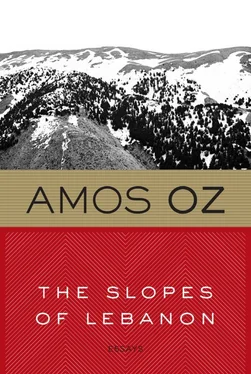Amos Oz
The Slopes of Lebanon
The Author wishes to thank David Twersky for having helped in the selection of the pieces for this volume.
IT WAS JUNE 1987. Exactly five years had passed since the invasion of Lebanon, and everyone was trying to forget it. Radio, television, and the press held a festival to mark the twentieth anniversary of the Six-Day War. They sponsored symposia, played Hebrew songs (“I Remember Bet H’arava,” “The Western Wall,” “Ammunition Hill”), held memorial services at military cemeteries, expressed their nostalgia for that smashing victory, and swooned over “Jerusalem of Gold.” And they also argued at length about what we describe with the loathsome phrase “the fruits of victory.”
Nobody here commemorated the war in Lebanon during that week. The fallen soldiers of the Six-Day War “belong to all of us,” but those who died in Lebanon belong only to their mothers now.
Until the Lebanon War, even someone like me had an admission ticket (perhaps for a place in some rear corner of the balcony, standing room only) to the enchanted world of “the beautiful Land of Israel,” to the Hebrew melodies, to the feelings of “a man [who] wakes up one morn, feels he is a people reborn, and begins to move forward,” in the words of A. Gilboa. During the Lebanon War, it was possible to hope that the blindness, the hunger for power, and the self-righteousness so evident then were only side effects of the war, and that when peace came, our health would be restored. But during the Lebanon War I understood, or thought I understood, at last, that the disease was deep-seated and widespread, that it might be something more than a by-product. Even now, after Lebanon, from time to time I search for something on which to pin my hope and in which to become involved. But life is not as it was before that war. What once was will never be again.
There are people on the left who, at this point, would say to me: “Good morning! Welcome to the real world.” In their eyes Israel was the bad guy long before Lebanon — ever since the rise of the Likud to power, *or since the administration of Golda Meir, or since the occupation of the West Bank and Gaza in 1967, or maybe ever since the beginning of the “Zionist penetration.” I do not agree with them. That debate has been aired in other places. I wrote this essay in June 1987 only in order to present what I remembered from the summer of 1982.
In August 1981, through the mediation of the American diplomat Philip Habib, a cease-fire agreement was reached between Israel and the PLO. Both sides honored that agreement along the Lebanese border. It was, I believe, the year with the fewest casualties since the establishment of our state. The PLO was distracted by its attempt to take control of wide areas in a disintegrating Lebanon. Another year and yet another, and part of Lebanon might perhaps have turned into a Palestinian state. And, indeed, the PLO invested great effort in establishing the infrastructure for a quasi-regular army, including several dozens of obsolete tanks and considerable artillery. Despite the exaggerations of Israeli propaganda, which publicized reports during the Lebanon War of “mammoth arms stockpiles,” the organized strength of the PLO did not come close even to the strength of a single Syrian or Jordanian division. The PLO had the power to be a nuisance and to draw blood before the Lebanon War, and it continues to have that capacity after the war. But it did not have the power to pose a threat to the survival of Israel, nor can it ever, by virtue of the limits of its potential, pose unaided such a threat in the future. All was quiet on the northern front.
On the night from Wednesday, June 2, to Thursday, June 3, 1987, the Israeli ambassador to Great Britain, Shlomo Argov, was shot in the head. Abu Nidal’s group claimed responsibility. The PLO spokesman in Beirut was quick to disassociate his organization from the crime, because the PLO was just then concentrating on a not entirely unsuccessful attempt to achieve international recognition so that Israel might be forced to accept it as a partner in negotiations over the future of the occupied territories. The government of Israel, however, placed full responsibility on the PLO for the attempted assassination of the ambassador. On Thursday afternoon, an acquaintance telephoned me and said, “Get ready, ol’ buddy! There’s going to be a little war pretty soon. Something like an expanded performance of the Litani raid in 1978. Only this time we’ll go as far as the Awali River or maybe even up to the Zaharani. Find it on the map. And we won’t pull back unless we can hand the whole package over to the good ol’ boys of Major Haddad.” And then he added another, cryptic, sentence, “Unless the whole of that Lebanon falls apart completely from our kick — in which case, anything may happen.”
That same night several reservists from Kibbutz Hulda were called up. Not many — maybe four or five. Early that Friday morning, convoys of military trucks, covered with tarpaulins, passed through nearby Bilu junction. At noon we could hear preparations going on at the Tel Nof air base. The regional civil-defense headquarters called our kibbutz coordinator and asked him to beef up our night watch. The army radio station began to put on special newscasts, and everything was just as it had been in the good old days, just as before the Sinai campaign of 1956, just as before the Six-Day War of 1967, just as before Yom Kippur of 1973. It was like a traveling troupe that completes its tour every few years and then returns for a repeat performance, except that in the meantime the actors have aged a bit, the old familiar stage props have become threadbare, and the whole audience recites the lines before the actors can utter the words. Only the children who have not seen the previous performances are excited.
But this time there is something missing. This time the familiar show seems to have shrunk. After a while you can feel a difference between this time and previous times; this time your stomach doesn’t contract in spasms of anxiety. Also missing is the fear that the war may descend upon our own red-tiled roofs here at the kibbutz. Unlike earlier wars, no one bothers to clean out the bomb shelters or to reinforce the windowpanes with strips of masking tape, to wash the heavy blackout curtains or to make up a duty roster for the infirmary. And suddenly it dawns on you: This game is fixed. The results of this war are clear from the outset, and, in any event, not one sliver from it will reach us here. The whole war will be taking place in another country, and may Allah have mercy on them. This time our whole country is not the battlefield, nor the people the army, and this time it is not a life-and-death struggle. This time Israel will have a war deluxe, and if someone should have doubts as to whether he’ll survive — well, it’s only the guy who’s being sent there, to the arena. The spectators can sit in the stands and munch popcorn. Or, instead of sitting and watching, they can go about their business as usual — everyone, that is, who doesn’t happen to care particularly for this war. For instance, they can go abroad for that planned vacation in Spain or Portugal, or they can finally get around to enclosing that porch, or they can open that restaurant, produce that first play, or trade in that old car. I mean, of course, everyone who hasn’t been called up himself, or whose loved ones haven’t been drafted. This time it’s not the whole nation that is at war; it is just the army, the government, and the newspapers. These lines bear witness to the abomination of this war, which was not forced upon us and was not fought to anticipate a threat to our survival, but, rather, to “achieve a result” or to “strike while the iron is hot.” It’s something like a timely investment in the stock market. This was never the case in Israel’s previous wars, not even in those that were regarded as controversial for one reason or another. And that is the essence of the horror that Menachem Begin was to describe a few weeks later as a “war of choice,” arguing that it is convenient, cheaper, and more worthwhile than “wars in which we have no alternative.” And, at the same time, his followers, in order to justify this war, will try retroactively to defile the earlier wars, claiming — along with Israel’s enemies — that actually we always did have a choice, that we always were the aggressor, that we always were lying when we claimed that our back was to the wall, and that Israel always flaunted specious, self-righteous arguments in order to cover up its gluttony; and it is no big deal, so what’s the shpiel, and would you kindly cut the crap and shut up.
Читать дальше












